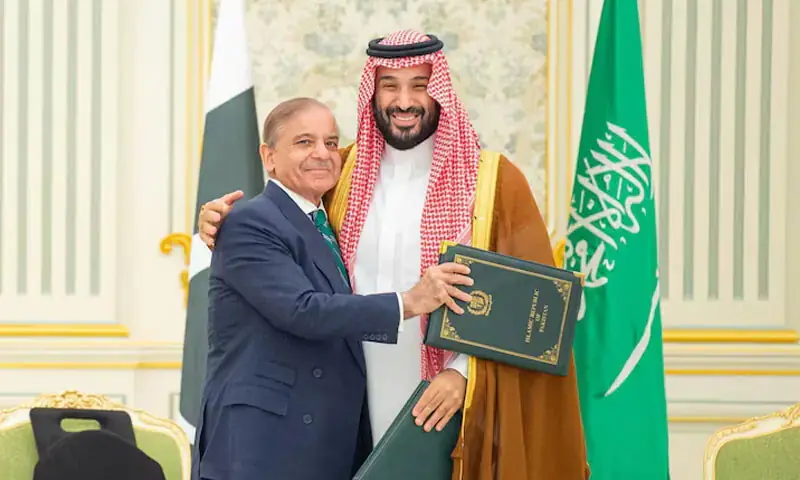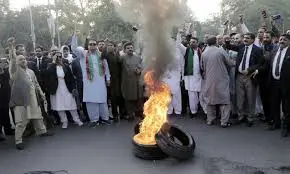Pakistan-Saudi Arabia defence pact forces India into strategic reassessment
The landmark defence agreement between Pakistan and Saudi Arabia has sent shockwaves through India, with leading geopolitical analyst and Eurasia Group President Ian Bremmer predicting, “This pact will change India’s strategic calculations”.
In an interview with an Indian news agency, Bremmer said the deal marks a fundamental shift in South Asia’s security landscape.
“India will now have to re-evaluate all of its security assumptions, as Pakistan is no longer standing alone — Saudi Arabia is now in its defence corner,” he remarked.
Key terms of the pact
The agreement, finalised during Prime Minister Shehbaz Sharif’s recent visit to Riyadh, has come after Israel’s strike on Doha, Qatar.
The pact outlines that an attack on either country will be considered an attack on both.
Indian media reports have gone further, claiming that the agreement may extend to Pakistan’s nuclear capabilities, suggesting that Saudi Arabia could rely on Pakistan’s nuclear deterrent in the event of an emergency.
Former Indian foreign secretary Kanwal Sibal, in a post on X (formerly Twitter), sounded an alarm: “This means Saudi funds will now bolster Pakistan’s military. It seems Pakistan is openly offering Arab nations nuclear protection against Israel.”
No secret Clauses, says Khawaja Asif
Defence Minister Khawaja Asif, in an interview with Al Jazeera, denied there were any hidden or side clauses in the agreement.
When asked whether the pact gives Saudi Arabia access to Pakistan’s nuclear weapons, Asif said: “This is a defence agreement and by no means aggressive in nature. Pakistan’s defensive capabilities, under this pact, will be available to support Saudi Arabia in any potential situation. However, let me be clear: the last use of nuclear weapons was in Hiroshima, and thankfully, the world has remained free from nuclear war since then. We hope it stays that way.”
India’s strategic reassessment
Ian Bremmer emphasised that the agreement marks a turning point: “If tensions persist on the Pakistan-India border and military escalation occurs, India will now face the possibility of Saudi Arabia siding with Pakistan. That completely alters India’s strategic calculations.”
However, Foreign Office spokesperson Shafqat Ali Khan clarified that the agreement is “purely defensive and not aimed at any third country”.
He added that both countries have made it clear that the pact is intended to promote peace, security, and stability in the region, and speculations based on false narratives are unfounded.
Bremmer also noted that while China remains Pakistan’s principal ally, providing military and intelligence support, Islamabad is now expanding its strategic partnerships in new directions.
“Saudi Arabia’s longstanding financial support of Pakistan’s nuclear programme is no secret. It has always viewed Pakistan’s nuclear arsenal as a potential emergency umbrella. For the first time, that understanding has been formalised into a binding agreement,” Bremmer said.
He added that Saudi Arabia is diversifying its security partnerships to reduce dependence on the United States, and this step strengthens Pakistan’s position while presenting India with a new geopolitical challenge.
Pakistan will consider attack on KSA as attack on itself
Rana Sanaullah, political adviser to the prime minister, said in a television interview that any Indian aggression against Pakistan will now be seen as aggression against Saudi Arabia, and vice versa.
“If India attacks Pakistan, it will be considered an attack on Saudi Arabia. Similarly, Israel knows that any attack on Saudi Arabia will be seen as an attack on Pakistan — and Pakistan will respond firmly,” Sanaullah warned.
US silence frustrates Saudi Arabia
Following Israel’s strike on Qatar, Saudi Arabia has reportedly grown frustrated with the US, particularly its silence and lack of pressure on Israel.
Bremmer noted: “The US neither stopped Israel nor condemned the attack. That stance is unacceptable to Saudi Arabia. As a result, Riyadh is now turning toward more reliable partners like Pakistan.”
India vows to safeguard national interests
India’s Ministry of External Affairs in a statement said, “We are studying the implications of this agreement on India’s national security, as well as regional and global peace. The Indian government is fully committed to safeguarding national interests.”
India has declared it is “keeping a close watch” on the development. However, analysts suggest that New Delhi is under significant strategic pressure and will likely respond with adjustments to its own defence posture.
For the latest news, follow us on Twitter @Aaj_Urdu. We are also on Facebook, Instagram and YouTube.
























Comments are closed on this story.